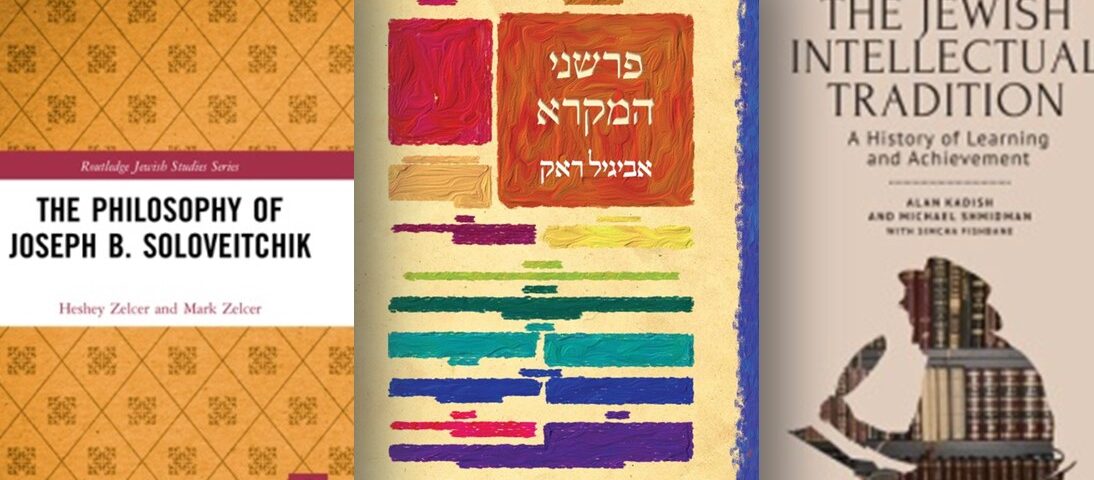New and Noteworthy Books

Avigail Rock, Parshanei HaMikra (Maggid Books)
This posthumous Hebrew volume, by a beloved and lamented Jerusalem educator, explores the methodologies of the great commentators of the Bible throughout the generations – from Targum Onkelos, through medieval commentators, such as Rashi, Ibn Ezra, and Ramban, to commentators of recent generations, such as Malbim, the Netziv, and others.
Heshey Zelcer and Mark Zelcer, The Philosophy of Joseph B. Soloveitchik (Routledge)
This monograph addresses the Rav’s treatment of the philosophical “reasons” for the commandments (ta’amei ha-mitzvot) are treated in his many books and essays; analyzes his views on Zionism, interfaith dialogue, and his positions on an array of issues he confronted as the leading voice within twentieth-century American Orthodoxy.
Alan Kadish and Michael A. Shmidman with Simcha Fishbane, The Jewish Intellectual Tradition: A History of Learning and Achievement (Academic Studies Press)
This team of authors suggests trace common principles that can be extracted from the millennia-long tradition of the Jewish intellectual enterprise. These principles include balancing respect for that tradition itself with independent and even often disruptive thinking; logical reasoning in pursuit of the truth; universal, lifelong learning; and the pursuit of a purposeful life. The volume sets out to understand the historical development of these principles and asks questions about their current state and potential for improving contemporary Jewish life.
Netanel Wiederblank, Illuminating Jewish Thought: Faith, Philosophy, and Knowledge of God (Maggid Books & Yeshiva University Press)
In this newest installment of Netanel Wiederblank’s series on Jewish thought, he sets out to explore questions such as: Can we prove that God exists, and if we can’t, why should we believe? What must we believe and what if we don’t? What does the Torah say about the age of the universe? Why study philosophy and what is the field of Jewish thought? The volume leads its readers on a tour of the traditional sources and considering their application to these challenges. [Read front matter here.]
David Fohrman, Exodus: A Parsha Companion (Maggid Books & AlephBeta)
In this second installment in his Parsha Companions series, David Fohrman deploys his well-admired tools for examining the Biblical text. With nuance, he draws our attention to problems we may have long overlooked and offers creative interpretive solutions, often with the aid of detecting patterns in the original Hebrew and rooting his own innovative explanations in the teachings of Hazal and Midrash. [Read the introduction here.]
Robert DiYanni, You Are What You Read: A Practical Guide to Reading Well (Princeton University Press)
The dialectical engagement with and text requires us to both submit and resist what we read; enter into its world, and ask critical questions about what the author is serving up to us. This book, originally pitched at university freshman, offers an enlightening guide that shows how we can increase the benefits and pleasures of reading literature by becoming more skillful and engaged readers. While focusing on texts from the literary canon, his advice on practical reading habits will have benefit for religious communities where ongoing textual engagement is of high value.
Yehoshua Grunstein, Musings of a Minyaner: Observations and Suggestions on a Minyan-Based Prayer Service
In this brief collection of essays, Yehoshua Grunstein marshals his skills as a clear and cogent writer on halakhic matters informed by philosophical and communal concerns. These essays, many of which have been shaped by COVID challenges, explore topics in tefilla be-tzibbur such as: When should davening together begin and end; reducing the amount of times the mourner’s kaddish is recited; who takes precedent to lead the service; learning and reading during the service; and more.
Ari Mermelstein, Power and Emotion in Ancient Israel: Community and Identity in Formation (Cambridge University Press)
Judaism historically contended that Jewish identity entails not simply allegiance to God and performance of the commandments but also the acquisition of specific emotional norms. Mermelstein suggests that these rules regarding feeling were both shaped by and responses to networks of power—God, foreign empires, and other groups of Jews—which threatened a sense of agency. Presented as a study of the history of emotions, this book argues that power relations are the basis for historical changes in emotion discourse.
Benjamin Schreier, The Rise and Fall of American Jewish Literature (University of Pennsylvania Press)
By examining the “breakthrough” moments of certain key American-Jewish authors (Malamud, Bellow, Roth, etc.), Schreier calls into question long-held assumptions and hardened cliches about how these writers depicted and helped shape the American Jewish experience [Read Introduction here.]
Michael Fishbane, Fragile Finitude: A Jewish Hermeneutical Theology (Chicago University Press)
Fishbane’s newest contribution to Jewish theology is a novel reinterpretation of the Book of Job modeling his presentation on the four classical modes of Jewish scriptural exegesis (Pardes). These focus on worldly experience; communal forms of practice and thought in the rabbinical tradition; personal development; and transcendent orientations.
Appearance here does not preclude review in our print journal or on TraditionOnline.org. Publishers can contact our editor to submit titles.

